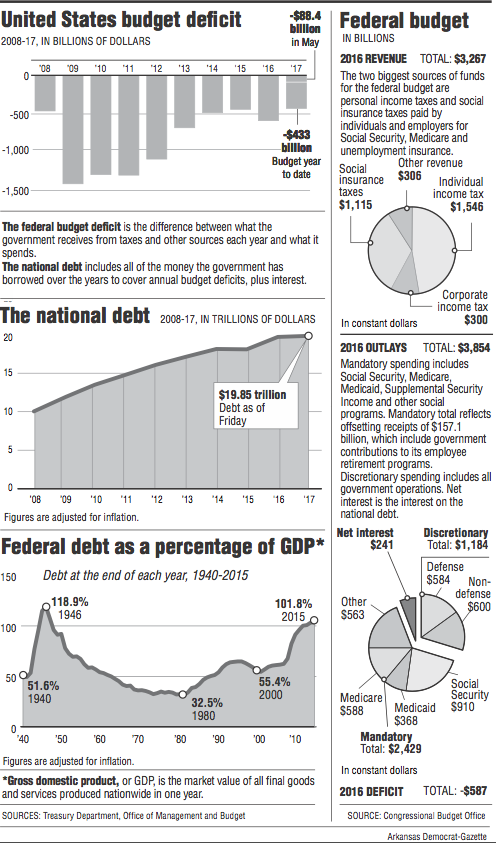WASHINGTON -- The U.S. budget deficit rose to $88.4 billion in May from $53 billion a year earlier, as government spending in areas such as Medicaid and defense rose at a faster pace than revenue.
Receipts from individual and corporate taxes rose 7 percent last month compared with those in May 2016, reaching $240 billion, the Treasury Department said Monday. Meanwhile, spending compared with the same period leapt 19 percent to $329 billion.
Tax revenue is rising, but at a slower pace than in previous years and by less than the Congressional Budget Office has forecast. That partly reflects slower growth in the economy and in hiring. With the unemployment rate low, fewer workers are available to take open jobs.
The deficit increased to $433 billion in the first eight months of the current budget year, which began Oct. 1, from $405 billion last year.
Medicaid costs have risen 3 percent, partly because the Patient Protection and Affordable Care Act has drawn more people to the program. Defense spending jumped 17 percent in May but overall has been flat this year.
The government has spent $35 billion more this year on interest on its debt, a rise of 14 percent, the Treasury Department said. That is mostly because inflation has picked up a bit since last summer, which pushes up interest payments on the government's inflation-adjusted bonds.
Also Monday, a Washington economic policy group projected that despite the slowdown in revenue, the government will have enough cash to pay its bills until October or November. The Bipartisan Policy Center estimate is more optimistic than that of Treasury Secretary Steve Mnuchin, who has been warning Congress that it must act before it leaves for its August recess.
The policy center said the revenue results from this month's quarterly tax payments are likely to clarify the deadline, but that for now Mnuchin has sufficient maneuvering room -- by using accounting steps known as "extraordinary measures" -- to keep the government solvent into the fall.
The Congressional Budget Office has projected that the deficit for the current budget year, which ends Sept. 30, will be $559 billion. That would mark a 4.6 percent drop from the 2016 deficit of $585.6 billion.
The budget office's deficit estimate is based on current law remaining unchanged. President Donald Trump has called for a program of tax cuts for individuals and businesses and for increased government spending on the military and on repairing the nation's aging infrastructure.
Information for this article was contributed by Andrew Taylor of the Associated Press.
A Section on 06/13/2017

